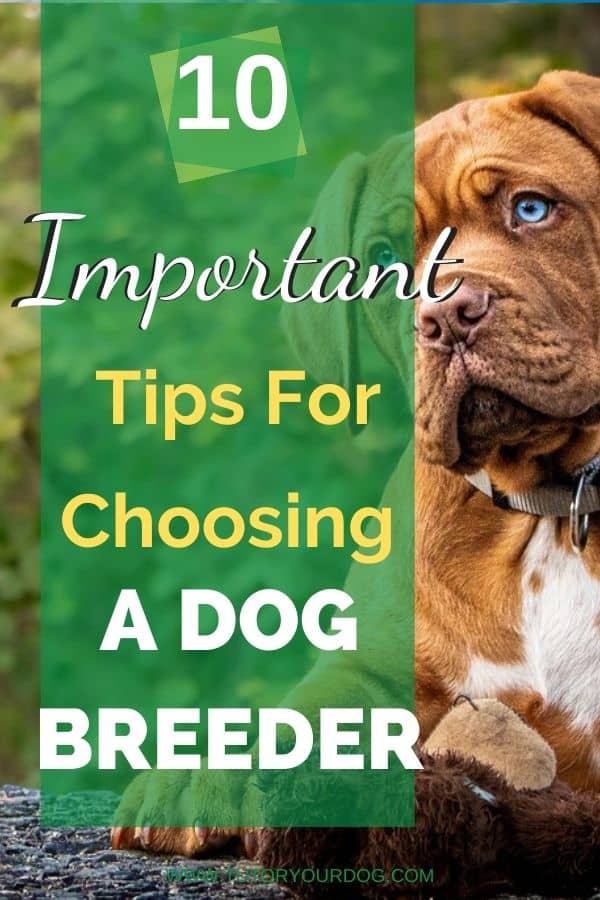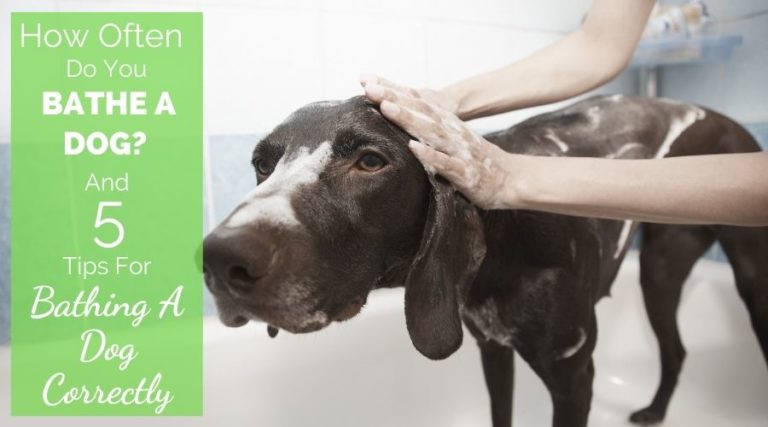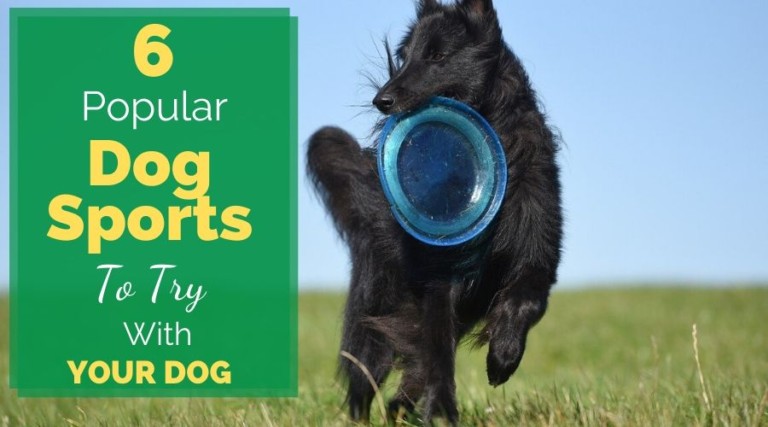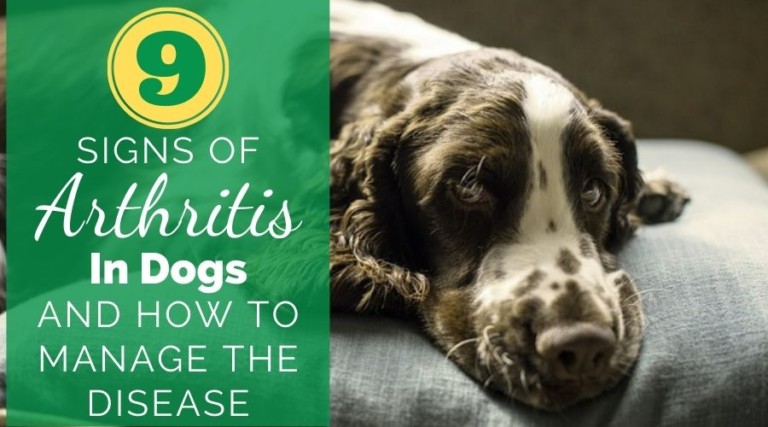{This post may contain affiliate links. This means we may make a small commission at no extra cost to you. This website is a participant in the Amazon Services LLC Associates Program. As an Amazon Associate we earn from qualifying purchases. We only recommend products that we believe will be of value to our followers. Click HERE to see our disclosure for details.}

Finding a puppy from a reputable breeder can be challenging if you don’t know what to look for or what to ask. Your puppy will be your new family member, it’s not the same as going out and buying a new car or kitchen appliance. It’s important for your puppy to have a good start to his life. Purchasing your puppy from a reputable, responsible, ethical breeder is the best way to make sure that this happens. Choosing a dog breeder doesn’t have to be difficult if you know what to look for.

What To Do Before You Contact A Reputable Dog Breeder
Before you can determine whether or not a particular dog will be a good fit for your family, there are two basic items that must be addressed.
Decide What Breed You Are Interested In
One, you must research breeds to know the breed of dog you want. Are you after a German Shepherd, Bernese Mountain dog, Newfoundland, Yorkshire Terrier or some other type? If it’s a German Shepherd that you want, you should be looking for german shepherd dog breeders.

Learn The Requirements Of The Breed
And two, you must be aware of some specific information about that breed. The information you need to be versed on includes the correct size for your dog breed as well as knowing characteristics from the breed standard. How often does the breed need to be brushed? How much activity or exercise do they need daily? If there are genetic diseases that are common with this type, have there been tests performed that have ruled these diseases out in this pup? And what else is required in maintaining the puppy’s health such as clipping nails.

Tips For Choosing A Responsible Dog Breeder
1. Avoid Dog Brokers
Some dog breeders don’t actually do the breeding themselves. In fact, they are actually dog brokers and not dog breeders. In some cases they can even be both a breeder and a broker. They buy their animals from other areas. You should stick with a breeder that breeds and raises the pups on site. The reason for this is that you can better determine if this puppy was raised in a clean environment. Without examining the puppy’s place of birth, you have no idea what sort of environment he was raised in. Puppies can end up with mental or physical deficiencies if brought up in a cruel or unkempt environment.
2. What Age Do The Puppies Go Home?
Another item for concern is the age of the puppies that you are interested in. The puppies should be at least eight weeks old before they are placed. Some breeders even keep their puppies for ten to twelve weeks. This is a critical time in a puppy’s life and they learn valuable lessons from their mom and their littermates. These lessons help them to understand how to properly behave around other dogs.
3. What Is The Age Of The Parents?
The parents of the puppies should be at least two years old before breeding. Waiting until the parents are at least two years old before using them for breeding allows the parents to mature both physically and mentally. This is important so that the dam of the litter can properly raise her puppies. Official OFA hip and elbow results aren’t available to be done until the dog is at least 2 years old as well.
4. What Health Testing Has Been Done On The Parents?
The parents should have been health tested for any possible genetic diseases. Each breed has specific issues that can be tested for. It is very rare that a breed or even mixed breed would have no genetic disorders to test for. Research the breed to find out what health issues are common for the breed and what health testing is available. Always ask the breeder to see official copies of the health testing. A reputable breeder will be happy that you asked.
5. How Are The Puppies Socialized?
When purchasing a puppy it’s important that the pups have had some interaction with other animals and people, including children. This is to help ensure that the dogs will be friendly and sociable. Socialization starts when the puppies are still with the breeder but will continue on even after you take the puppy home.
6. Does The Breeder Offer Support Once You Take The Puppy Home?
It’s also a good idea to get your puppy from a dog breeder that will allow you to call him later with any questions or concerns you may have about your dog. Choosing a dog breeder who provides support for the life of your puppy is important for so many reasons. The breeder knows your puppy better than anyone else and will be able to give you advice and guidance on how to properly care for your puppy. Reputable breeders like to keep in contact with their puppy owners…if you find a breeder who doesn’t care about keeping in contact, run!
7. How Many Breeds Are Being Raised By The Breeder?
There is a lot to know about breeding dogs and it’s very hard to find a competent experienced dog breeder who raises more than 4 or 5 different breeds. If he raises 6 or 8 or more, it’s probably a good idea to look elsewhere for your puppy. Also, most experienced and reputable breeders belong to one or more breed clubs so ask them if that’s true with them.



8. Are Potential Puppy Owners Screened?
As you are concerned about the specific breeder, he should also show some concern with you as well. If he asks you questions about they type of environment that you will raising the pup, your family, and your experience with animals, it’s usually a good sign that the puppy has been raised with love. The breeder should have concern for the placement of his puppies.
9. What Paperwork Do You Get With Your Puppy?
Once you have made a decision to buy a specific dog, there are few other items that should be addressed. You should receive a registration certificate application with your purchase (in some countries, such as Canada, the breeder registers your puppy and will send you the registration certificate later). You should also require the seller to give you a 3-generation pedigree chart for the dog, a health record of the dog that includes dates the puppy was inoculated or received other veterinary care.



10. Is There A Contract And Guarantee?
Another important item is a health guarantee, you should require one. If it’s later discovered that the dog suffers from a genetic disease, for example, you should have some recourse. Along these same lines you should have in writing that you are required, within a reasonable amount of time, to have the puppy examined by a veterinarian at your own expense. And if it is found that the dog you have purchased has any defects, as determined by the veterinarian, you can return the puppy for a full refund.
The breeder’s contract should outline the breeder’s expections for the care of the puppy. There is no set guarantee or contract for breeders so you may find that each breeder you talk to may have different terms. Find a breeder that has terms that you intend to meet and that you are comfortable with.
Finding the perfect dog can be a long and tedious process, but with a little preparation, education and effort it’s possible to find a healthy, well bred puppy!







